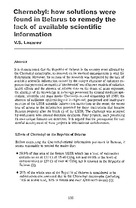| dc.contributor.author | Lazarev, V. S. | en |
| dc.coverage.spatial | London | en |
| dc.date.accessioned | 2016-09-30T08:32:43Z | |
| dc.date.available | 2016-09-30T08:32:43Z | |
| dc.date.issued | 1999 | |
| dc.identifier.citation | Lazarev, V. S. Chernobyl: how solutions were found in Belarus to remedy the lack of available scientific information / V. S. Lazarev // Disaster and after. The practicalities of information service in times of war and other catastrophes: Proceedings of an international conference sponsored by IGLA (The International Group of the Library Association), 4-6 September 1998, University of Bristol / Ed. by P. Sturges, D. Rosenberg. – London: Taylor Graham Publishers, 1999. – P. 135-149. | en |
| dc.identifier.uri | https://rep.bntu.by/handle/data/25423 | |
| dc.description.abstract | It is demonstrated that the Republic of Belarus is the country most affected by the Chernobyl catastrophe, so research on its medical consequences is vital for Belarusians. However, the success of the research was hampered by the lack of available scientific information caused by the unique character of radiation exposure that prevented an uncritical ‘mechanical’ use of known models of radiation health effects and the absence of reliable data on the doses of acute exposure; the shortage of the knowledge in radiology possessed by clinical medicine specialists; scientific and mass media Chernobyl-related censorship till 1989; the absence of sufficient epidemiological background; postponed and inadequate reaction of the USSR scientific information institutions to the event; the recent loss of access to the information provided by these institutions that became Russian property after the break up of the USSR. The challenge was accepted by enthusiasts who created domestic databases. Four projects, each possessing its own unique features arc described. It is argued that the prerequisite for successful development of these projects is international collaboration. | en |
| dc.language.iso | en | en |
| dc.publisher | Taylor Graham Publishers | en |
| dc.title | Chernobyl: how solutions were found in Belarus to remedy the lack of available scientific information | en |
| dc.type | Article | ru |

